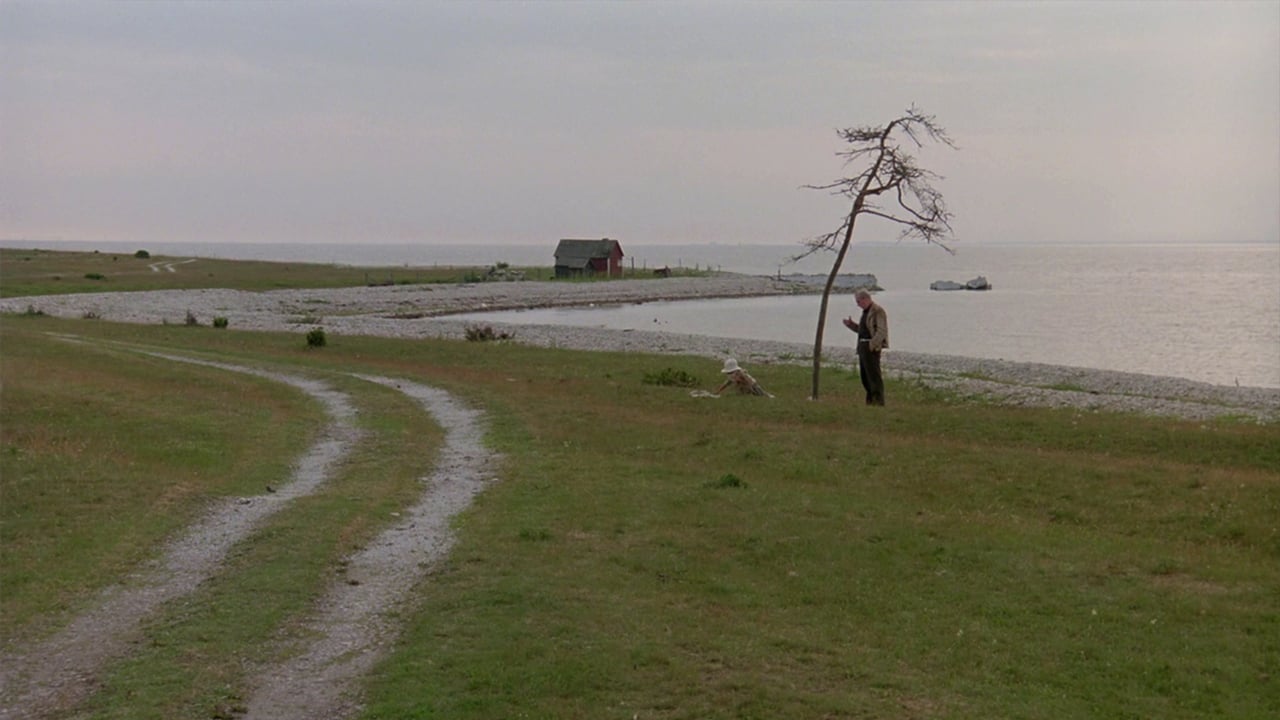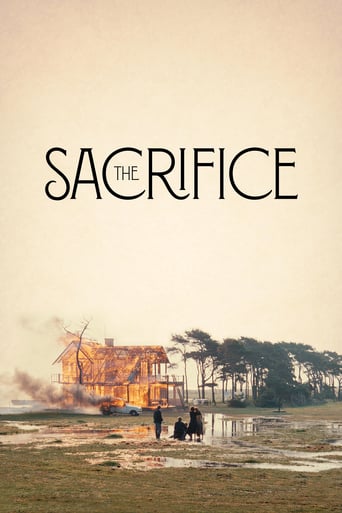



When a movie has you begging for it to end not even half way through it's pure crap. We've all seen this movie and this characters millions of times, nothing new in it. Don't waste your time.
View MoreI really wanted to like this movie. I feel terribly cynical trashing it, and that's why I'm giving it a middling 5. Actually, I'm giving it a 5 because there were some superb performances.
View MoreThis is a gorgeous movie made by a gorgeous spirit.
View MoreOne of the best movies of the year! Incredible from the beginning to the end.
View MoreWhat strikes you first in this film is the very careful and extremely esthetic visual composition: every scene is like a beautiful painting, and Tarkovsky's knack for making his women exceptionally beautiful enhances the visual gratification. The actors are also all very good, Erland Josephson and Allan Edwall leading the extremely extraordinary speculations. A retired celebrity of letters and the theatre celebrates his birthday together with his friends and family in an isolated beautiful spacious old-fashioned house by the sea, when apparently the third world war breaks out. His wife immediately succumbs to hysterics, the young doctor Victor (Sven Wollter) gives them sedatives, the professor drinks brandy, while his friend Otto (Allan Edwall) comes with bizarre alternatives.I always had some difficulty with Tarkovsky's later abstract films for their extremely slow pace marked by a total absence of action, especially "Stalker" and "Nostalgia", but here something keeps happening all the time to keep you awake and interested: small details, the child's pranks, the mysterious kitchen maid in her beauty, Otto's indispensable bicycle, mirrors of course, breathtaking long shots, and above all the philosophical or parapsychological development going to bizarre extremes. How is this predicament to be dealt with? That's the issue of the labyrinth leading you on for constantly more exciting thought and practical experiments.This was the year of Ronald Reagan's strikes against Libya, the beginning of the Glasnost movement with Gorbachev, and the murder of the Swedish Prime Minister Olof Palme, a mystery still unresolved. And in the end of the year after this film Andrei Tarkovsky died of cancer at 54, which he probably had attracted from toxic fumes as early as during the shooting of "Stalker".There is much of Bergman here, the team is all Bergman's, and one could describe the film as more Bergman than Bergman. There is also many reminiscences of Carl Th. Dreyer, but it's still definitely all Tarkovsky: you recognize his special peculiarities and details in almost every scene.The most peculiar detail of the film is perhaps the surrealistic war scenes of total confusion showing random people running about in bewilderment among the ruins of a car and a lot of rubbish. The street shown in this scene is the very place where Prime Minister Olof Palme was shot six months after the film had been completed, and the camera is placed on the very spot - a notable coincidence.So where does all this lead to? Pure metaphysics. It's definitely a masterpiece of art but very difficult to understand, but it presents a very intriguing thought experiment - the professor is willing to sacrifice everything if the war is averted, he does sacrifice everything including his own mind, and he seems to achieve the desired result.The film is dedicated to the director's son, and the son in the film clearly stands in for him and both introduces and ends the film - to Bach's most beautiful air from the Passion of St. Matthew - "Have mercy", "Erbarme dir..."
View MoreIt is difficult to watch a Tarkovskij film if you are already tired (having his films only in subtitled editions doesn't help), I actually fell asleep during this at a certain point in the film, had to take a pause, and continue when I got back awake. I also liked other Tarkovskij films better, like Andrej Rubljev or Stalker, but still liked this a lot.Nonetheless, Offret is really a good film, both from a cinematographical point of view, both from the story and the storytelling point of view. It's one of those Russian films where not much happens during the story, some of the scenes might seem awkward to a modern- day audience, but you still feel blown away. This and Nostalghia actually required me to check a few analises to understand better the story. They're way more hermetic than other Tarkovskij films, but no less good. I particularly loved the choice for the setting and the music (Despite it didn't show up much in the film). Anyhow, I suggest to watch Offret twice, and to read a good analisis of the thematics in the film before the second view. It helps a lot in understanding the story, the reason of certain things, and to appreciate better the movie.
View MoreWhile not quite his best film(Andrei Rublev), The Sacrifice, like every film Andrei Tarkovsky did, still manages to be a wonderful film. Like other Tarkovsky films, particularly Solaris, it requires a lot of patience- like Solaris The Sacrifice has a rather ponderous and static first 30 minutes that might alienate viewers- but if stuck with it is very rewarding.Tarkovsky's films are some of the most visually accomplished and beautiful films ever seen, and The Sacrifice certainly is visually accomplished and beautiful with positively dream-like photography, evocative scenery that reflects the horror of nuclear war brilliantly and stirring images and symbolism that are not too hard to understand. That's unsurprising though considering it's from Sven Nykvist, an Ingmar Bergman regular and one of the greatest cinematographers who ever lived. Tarkovsky's direction, which always had a rare consistency in quality(to me he never made a bad film- one of the few directors for that to be the case- even my least favourite Ivan's Childhood is great as well as his most accessible), is as usual exemplary. There is a vast Bergman influence here in terms of themes, but there is enough of Tarkovsky's style to still make it feel still like a Tarkovsky film.The music is haunting and melancholic, like with Mirror Bach has never been more effectively used on film, and the script evokes a lot of thought and succeeds in giving dimension to the characters. The story is more rigid and uncomprisingly detached than Tarkovsky's other films, but while the film is deliberately slow and long there still is a lot of power and emotional impact, especially in the truly miraculous scene with the witch and the powerful epilogue. The acting suits the film very well indeed with Bergman regular Erland Josephsen giving a compelling performance in the multi-faceted lead role. Overall, not his best film, for me it ranks around the middle of his filmography, but Tarkovsky's final film(he probably would have done more films had he not died so young) hits a high note. 9/10 Bethany Cox
View MoreTarkovsky movies aren't among the easiest films to appreciate instantly. Some argue they feel drawn-out, feature a very typical, hard to decipher imagery, a somewhat detached language, create all in all very inaccessible worlds, at least on first glance. In a way, yes, but once you get in you'll find that they always deal with essential issues of life and faith, grow on you and offer to explore new perspectives on repeated viewings, eventually leave a lasting impression. Take "Offret" ("The Sacrifice") for example.Not only was the movie shot in Sweden, but Tarkovsky also clearly channels Bergman in this one, even uses parts of his crew, which plays well into the themes at stake. But he more than re-hashes "Wild Strawberries", "The Seventh Seal" or similar Bergman works that deal with death or re-evaluation of one's life. At any rate it's Tarkovsky's last movie and in many ways autobiographical and personal. It is a deep character study and deals with the reflections of an intellectual on his past life, which becomes unhinged at some point - and the changed circumstances demand a final, definite answer. The film is carefully constructed and leads from seemingly casual conversations of a life that is in complete order to something rather different. However, while the path that leads to the conclusion might be there right in front of you on screen, it's up to the viewer to decide where to draw the line between reality, imagination or dream. The viewer also has it in hand to determine the ultimate reasons why certain things happen: whether an atheist has suddenly become pious in the face of death and God answers, or innermost convictions have surfaced, even if witchcraft is in play or the wheel of life itself just turns once more thanks to the Nietzschean eternal recurrence, a theory a certain postman ascribes to. The spectrum of Tarkovsky's "Sacrifice" is enormous and the picture is as substantial as the viewer is willing to concede.
View More